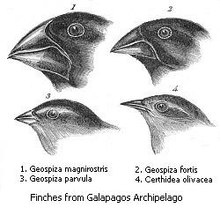Neoendemism
Neoendemism is one of two sub-categories of
ecological state of a species being unique to a defined geographic location. Specifically, neoendemic species are those that have recently arisen, through divergence and reproductive isolation or through hybridization and polyploidy in plants. Paleoendemism
, the other sub-category, refers to species that were formerly widespread but are now restricted to a smaller area.
Examples

"Darwin's finches", residents of the Galápagos Islands, have been used since the 19th century as an example of how the descendants of one ancestor can evolve through adaptive radiation into several species as they adapt to different conditions on various islands. Charles Darwin wrote:
...one might really fancy that from an original paucity of birds in this archipelago, one species had been taken and modified for different ends."[1][2]
The Galápagos archipelago is also the home of paleoendemic species.[3]
The
American southwest has fostered a parallel history of taxonomic disagreements of where genus and species distinctions should apply.[6]
It thus provides a case study of neoendemism in conifers. As well, it illustrates an element of ongoing human impact — wind-dispersed pollen contamination from horticultural plantings — that cannot easily be corrected to meet conservation goals.
See also
Notes
- ^ Darwin 1845, pp. 379–380
- ^ Darwin 1887
- S2CID 86121432.
- ^ U.S. Fish and Wildlife Service. 1987. Endangered and threatened wildlife and plants; Determination of endangered status for Cupressus abramsiana (Santa Cruz cypress). Federal Register 52: 675-679. https://ecos.fws.gov/docs/federal_register/fr1017.pdf
- ^ U.S. Fish and Wildlife Service. 2016. Endangered and Threatened Wildlife and Plants; Reclassifying Hesperocyparis abramsiana (=Cupressus abramsiana) as Threatened. Federal Register Vol. 81. No. 33. https://www.govinfo.gov/link/fr/81/8408?link-type=pdf
- PMID 21712198.
References
- Darwin, Charles (1845), Journal of researches into the natural history and geology of the countries visited during the voyage of H.M.S. Beagle round the world, under the Command of Capt. Fitz Roy, R.N (2nd. ed.), London: John Murray
- PMC 2604052
